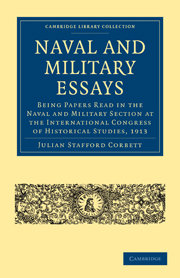 Naval and Military Essays
Naval and Military Essays Book contents
- Frontmatter
- PREFACE
- Contents
- A—NAVAL
- HISTORIANS AND NAVAL HISTORY
- STAFF HISTORIES
- NAVAL HISTORY FROM THE NAVAL OFFICER'S POINT OF VIEW
- SAMUEL PEPYS AS A NAVAL OFFICIAL
- NAVAL HISTORY AND THE NECESSITY OF A CATALOGUE OF SOURCES
- APPENDIX: ROUGH GUIDE TO BRITISH SOURCES OF NAVAL HISTORY IN THE SEVENTEENTH CENTURY
- B—MILITARY
- INDEX
STAFF HISTORIES
Published online by Cambridge University Press: 07 September 2010
- Frontmatter
- PREFACE
- Contents
- A—NAVAL
- HISTORIANS AND NAVAL HISTORY
- STAFF HISTORIES
- NAVAL HISTORY FROM THE NAVAL OFFICER'S POINT OF VIEW
- SAMUEL PEPYS AS A NAVAL OFFICIAL
- NAVAL HISTORY AND THE NECESSITY OF A CATALOGUE OF SOURCES
- APPENDIX: ROUGH GUIDE TO BRITISH SOURCES OF NAVAL HISTORY IN THE SEVENTEENTH CENTURY
- B—MILITARY
- INDEX
Summary
Of late years there has been a large output of work from the Historical Sections of Naval and Military Staffs, which has wrought a revolution in the study of war history. No historian whose task has brought him in touch with this work can fail to appreciate its value, nor in the care and thoroughness of its methods can we fail to recognise a complete change in the attitude of the Services to history. The underlying cause of the change is not far to seek. It is, primarily at least, due to the sound and philosophical method which the Historical Sections have adopted that has led them directly to an appreciation of the practical living value of history—that has revealed history not as a museum of antiquities, but as a treasure-house of rich experience.
For I would venture to say that the scepticism as to the practical value of historical study which formerly existed in the Services—and especially in the Naval Service—was mainly due to unsound method. The common procedure was that men, who from their own practical experience had convinced themselves that some particular method or means of conducting war should be adopted, were accustomed to go to such history as was available for facts to demonstrate their preconceived opinion. Their opponents met them with a similar selection of facts, and the inevitable result was a sceptical feeling that history like statistics could prove anything, and with practical men history was brought into contempt.
- Type
- Chapter
- Information
- Naval and Military EssaysBeing Papers read in the Naval and Military Section at the International Congress of Historical Studies, 1913, pp. 23 - 38Publisher: Cambridge University PressPrint publication year: 2009First published in: 1914


